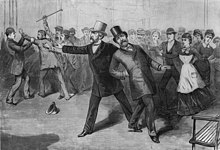Assassination of James A. Garfield
| Assassination of James A. Garfield | |
|---|---|

President Garfield with James G. Blaine after being shot by Charles J. Guiteau
|
|
| Location | Baltimore and Potomac Railroad Station, Washington, D.C. |
| Coordinates | 38°53′31″N 77°01′13″W / 38.89194°N 77.02028°WCoordinates: 38°53′31″N 77°01′13″W / 38.89194°N 77.02028°W |
| Date | July 2, 1881 9:30 am (Eastern Time) |
| Target | James A. Garfield |
|
Attack type
|
Assassination |
| Weapons | Bulldog Revolver |
| Deaths | 1 (Garfield) |
|
Non-fatal injuries
|
None |
| Perpetrator | Charles J. Guiteau |
| Motive | Retribution for perceived failure to reward campaign support |
The assassination of President James A. Garfield took place at 9:30 am on July 2, 1881, less than four months into Garfield's term as the 20th President of the United States. Garfield was shot by Charles J. Guiteau at the Baltimore and Potomac Railroad Station in Washington, D.C., and died in Elberon, New Jersey on September 19, 1881. Garfield was the second of four Presidents to be assassinated, following Abraham Lincoln and preceding William McKinley and John F. Kennedy. His Vice President, Chester A. Arthur, succeeded Garfield as President.
Garfield survived the longest after being shot, compared with the other presidents who were assassinated. Lincoln died nine hours after being shot, McKinley survived for a week before dying, and Kennedy died almost instantly. Garfield's assassin also lived the longest after the event, executed almost a year following the shooting and nine months after Garfield's death. John Wilkes Booth was hunted down and killed eleven days after Lincoln's death, Leon Czolgosz was executed just over a month after killing McKinley, and Lee Harvey Oswald was shot and killed by Jack Ruby two days after assassinating Kennedy.
Charles Guiteau turned to politics after failing in several ventures, including theology, a law practice, bill collecting, and time in the utopian Oneida Community. He wrote a speech in support of Ulysses S. Grant called "Grant vs. Hancock." Grant was the early front runner for the Republican nomination for president in the election of 1880, but lost to Garfield. Guiteau then revised his speech to "Garfield vs. Hancock" and though he tried to sign on as a campaigner for the Republican ticket, he never delivered the speech in a public setting, instead printing and distributing several hundred copies. Guiteau's speech, even in written form, was ineffective. Among other problems, his hurried effort to replace references to Grant with references to Garfield was incomplete. But Guiteau convinced himself that this speech was largely responsible for Garfield's narrow victory over Democratic nominee Winfield S. Hancock. Guiteau believed he should be awarded a diplomatic post for his supposedly vital assistance, first asking for a consulship in Vienna, then expressing a willingness to "settle" for one in Paris. He loitered around Republican headquarters in New York City, expecting rewards for his speech, to no avail.
...
Wikipedia
